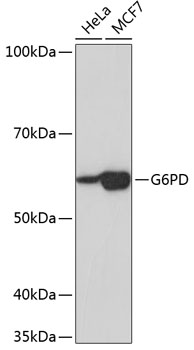Metabolism Antibodies 3
Anti-G6PD Antibody (CAB11234)
- SKU:
- CAB11234
- Product Type:
- Antibody
- Reactivity:
- Human
- Host Species:
- Rabbit
- Isotype:
- IgG
- Antibody Type:
- Monoclonal Antibody
- Research Area:
- Metabolism
Description
| Antibody Name: | Anti-G6PD Antibody |
| Antibody SKU: | CAB11234 |
| Antibody Size: | 20uL, 50uL, 100uL |
| Application: | WB |
| Reactivity: | Human |
| Host Species: | Rabbit |
| Immunogen: | A synthesized peptide derived from human G6PD |
| Application: | WB |
| Recommended Dilution: | WB 1:500 - 1:2000 |
| Reactivity: | Human |
| Positive Samples: | HeLa, MCF7 |
| Immunogen: | A synthesized peptide derived from human G6PD |
| Purification Method: | Affinity purification |
| Storage Buffer: | Store at -20°C. Avoid freeze / thaw cycles. Buffer: PBS with 0.02% sodium azide, 0.05% BSA, 50% glycerol, pH7.3. |
| Isotype: | IgG |
| Sequence: | Email for sequence |
| Gene ID: | 2539 |
| Uniprot: | P11413 |
| Cellular Location: | |
| Calculated MW: | 59kDa |
| Observed MW: | 59KDa |
| Synonyms: | G6PD1 |
| Background: | This gene encodes glucose-6-phosphate dehydrogenase. This protein is a cytosolic enzyme encoded by a housekeeping X-linked gene whose main function is to produce NADPH, a key electron donor in the defense against oxidizing agents and in reductive biosynthetic reactions. G6PD is remarkable for its genetic diversity. Many variants of G6PD, mostly produced from missense mutations, have been described with wide ranging levels of enzyme activity and associated clinical symptoms. G6PD deficiency may cause neonatal jaundice, acute hemolysis, or severe chronic non-spherocytic hemolytic anemia. Two transcript variants encoding different isoforms have been found for this gene. [provided by RefSeq, Jul 2008] |
| UniProt Protein Function: | G6PD: glucose-6-phosphate dehydrogenase. A cytosolic enzyme encoded by a housekeeping X-linked gene whose main function is to produce NADPH, a key electron donor in the defense against oxidizing agents and in reductive biosynthetic reactions. G6PD is remarkable for its genetic diversity. Many variants of G6PD, mostly produced from missense mutations, have been described with wide ranging levels of enzyme activity and associated clinical symptoms. G6PD deficiency may cause neonatal jaundice, acute hemolysis, or severe chronic non-spherocytic hemolytic anemia. Two splice variant isoforms have been described. The long isoform is found in lymphoblasts, granulocytes and sperm. |
| UniProt Protein Details: | Protein type:EC 1.1.1.49; Carbohydrate Metabolism - pentose phosphate pathway; Cell development/differentiation; Other Amino Acids Metabolism - glutathione; Oxidoreductase Chromosomal Location of Human Ortholog: Xq28 Cellular Component: centrosome; cytoplasm; cytosol; internal side of plasma membrane; intracellular membrane-bound organelle; membrane; microtubule organizing center Molecular Function:glucose binding; glucose-6-phosphate dehydrogenase activity; identical protein binding; NADP binding; protein binding; protein homodimerization activity Biological Process: cholesterol biosynthetic process; erythrocyte maturation; glucose 6-phosphate metabolic process; glutathione metabolic process; lipid metabolic process; NADP metabolic process; NADPH regeneration; pentose biosynthetic process; pentose-phosphate shunt; pentose-phosphate shunt, oxidative branch; ribose phosphate biosynthetic process; substantia nigra development Disease: Anemia, Nonspherocytic Hemolytic, Due To G6pd Deficiency; Favism, Susceptibility To; Malaria, Susceptibility To |
| NCBI Summary: | This gene encodes glucose-6-phosphate dehydrogenase. This protein is a cytosolic enzyme encoded by a housekeeping X-linked gene whose main function is to produce NADPH, a key electron donor in the defense against oxidizing agents and in reductive biosynthetic reactions. G6PD is remarkable for its genetic diversity. Many variants of G6PD, mostly produced from missense mutations, have been described with wide ranging levels of enzyme activity and associated clinical symptoms. G6PD deficiency may cause neonatal jaundice, acute hemolysis, or severe chronic non-spherocytic hemolytic anemia. Two transcript variants encoding different isoforms have been found for this gene. [provided by RefSeq, Jul 2008] |
| UniProt Code: | P11413 |
| NCBI GenInfo Identifier: | 116242483 |
| NCBI Gene ID: | 2539 |
| NCBI Accession: | P11413.4 |
| UniProt Secondary Accession: | P11413,Q16000, Q16765, Q8IU70, Q8IU88, Q8IUA6, Q96PQ2 D3DWX9, |
| UniProt Related Accession: | P11413 |
| Molecular Weight: | 62,468 Da |
| NCBI Full Name: | Glucose-6-phosphate 1-dehydrogenase |
| NCBI Synonym Full Names: | glucose-6-phosphate dehydrogenase |
| NCBI Official Symbol: | G6PD |
| NCBI Official Synonym Symbols: | G6PD1 |
| NCBI Protein Information: | glucose-6-phosphate 1-dehydrogenase |
| UniProt Protein Name: | Glucose-6-phosphate 1-dehydrogenase |
| UniProt Gene Name: | G6PD |
| UniProt Entry Name: | G6PD_HUMAN |





![G6PD Monoclonal Antibody [PAT2F6AT] (CPAB0149) G6PD Monoclonal Antibody [PAT2F6AT] (CPAB0149)](https://cdn11.bigcommerce.com/s-rd6ounxcu2/images/stencil/590x590/products/58375/63557/g6pd-monoclonal-antibody-pat2f6at-cpab0149__34834__87616.1706534989.jpg?c=1)
![[KD Validated] G6PD Polyclonal Antibody (CAB22242) [KD Validated] G6PD Polyclonal Antibody (CAB22242)](https://cdn11.bigcommerce.com/s-rd6ounxcu2/images/stencil/590x590/products/82463/87250/A22242_1__36423__87257.1706547347.jpg?c=1)
![[KD Validated] G6PD Polyclonal Antibody (CAB21750) [KD Validated] G6PD Polyclonal Antibody (CAB21750)](https://cdn11.bigcommerce.com/s-rd6ounxcu2/images/stencil/590x590/products/82086/86875/A21750_1__42695__83766.1706547097.jpg?c=1)